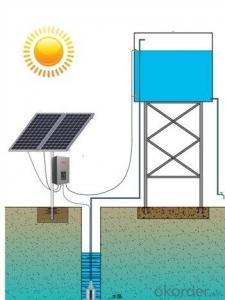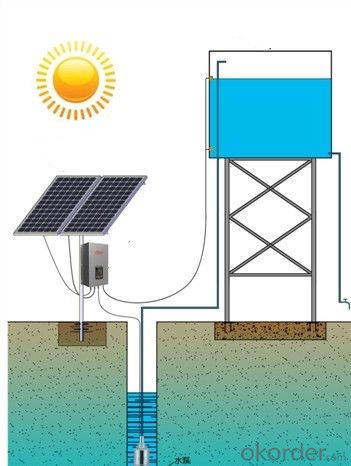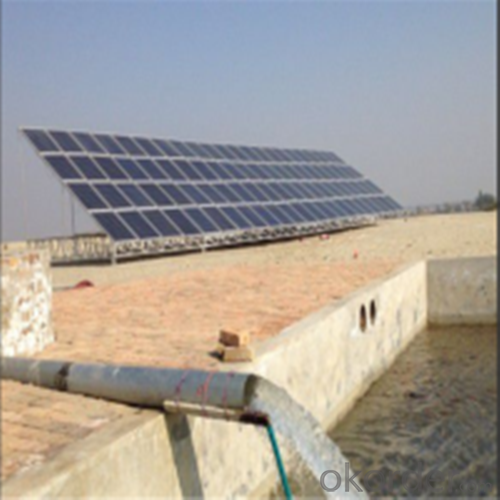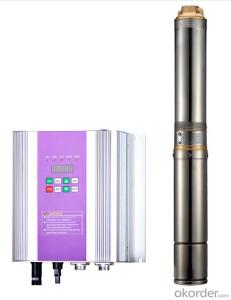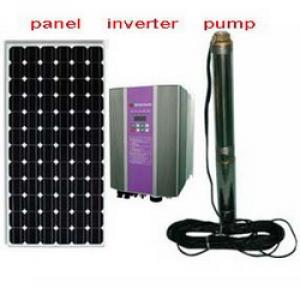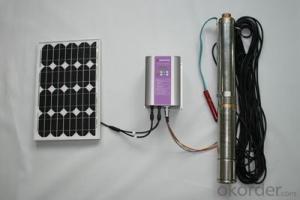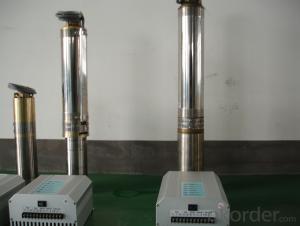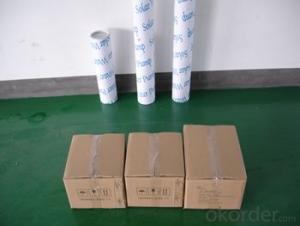Solar Pump 12v DC Solar Powered Water Pump System for Solar Pool Pumps
- Loading Port:
- Shanghai
- Payment Terms:
- TT OR LC
- Min Order Qty:
- 1 set
- Supply Capability:
- 1000 set/month
OKorder Service Pledge
OKorder Financial Service
You Might Also Like
Solar Powered Water Pump System Solar Pool Pumps
DC solar water pumping system consists of the motor, pump, controller, solar array and some other accessories, such as water level sensor, float switch, etc. Considered that storing water is more efficient than storing electricity, the system is designed to directly drive the pump without battery which can reduce the construction and operating cost and routine maintenance effectively.The PV array consists of multiple solar panels connected in series/parallel, which can supply the whole system as power source by converting the absorbed solar radiation energy to the electrical energy. The pump driven by a brushless DC permanent magnet motor draws water from deep-well or river. The pumped water is then fed into reservoir or water tank, or connected to the irrigation system or fountain system directly.
Advanced Technology
Applications Innovation
The efficiency of DC brushless permanent magnet motor has been increased up to 25% in comparison with traditional asynchronous motor.
Technology Innovation
Stator and rotor are sealed by environment friendly casting resin.Motor insulation resistance can be hold higher than 300MΩfor more than 10 years, which consumedly increased the security and reliability of the submersible motor.
Structure Innovation
Casting resign technology processed stator and rotor as well as the water lubricated bearing make the submersible pump environment friendly.
Feature
High Efficiency & High Reliability
DC Brushless Permanent Magnet Motor
Minimum Maintenance, long Service Life
Environment Friendly Materials, Lubricated Without Oil
Application
Village or Family Water Supply
Animal Drinking Water & Livestock Watering
Garden/Courtyard Irrigation
Swimming Pool
Water Supply for Bivouac or Camping Car
Water Supply for Remote Area
Automatic Control
Operate Automatically, No Need Watching
Maximum Power Point Tracking (MPPT)
Dry-run Protection
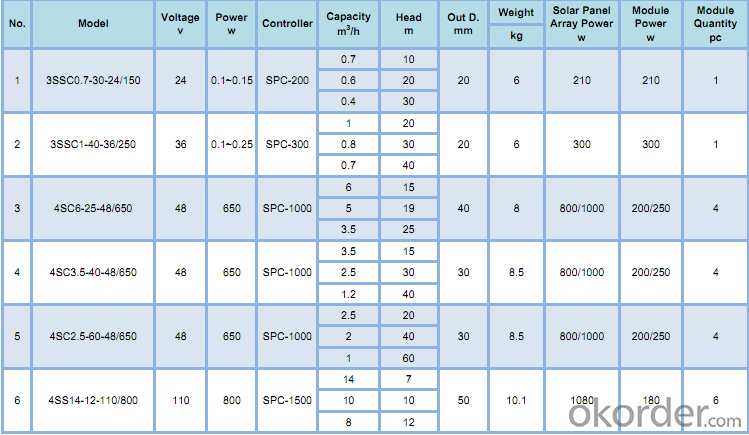
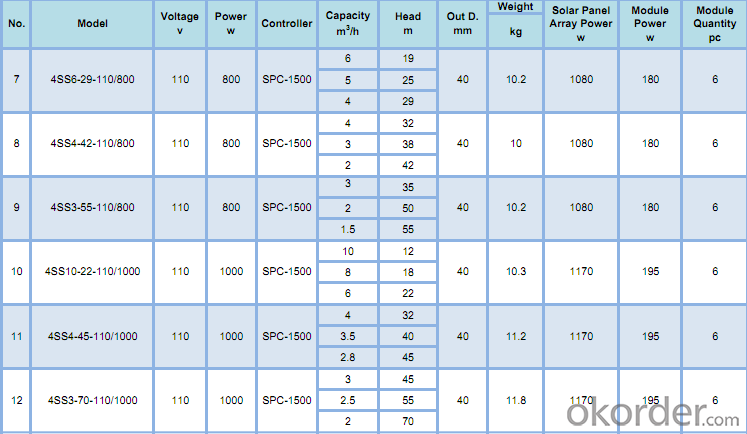
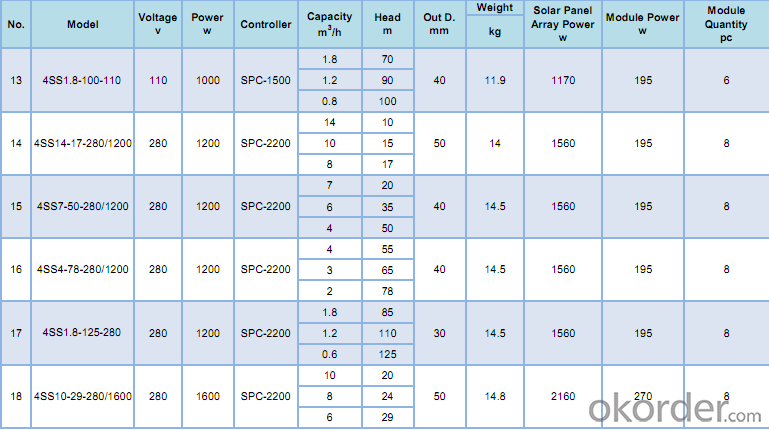
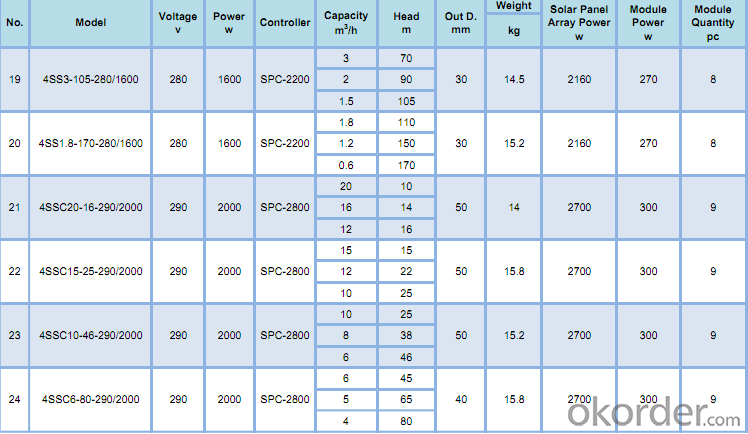
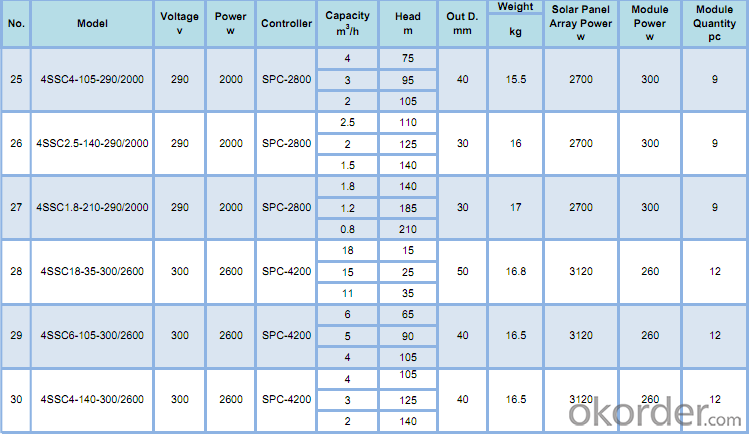
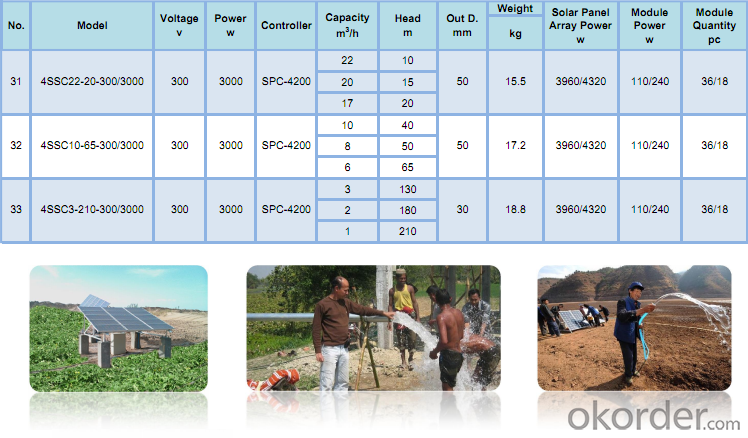
- Q: How does a solar pump handle water source contamination from mining activities?
- A solar pump itself does not directly handle water source contamination from mining activities. However, it can be used as a tool to access alternative water sources that are not affected by mining activities. By utilizing a solar pump, clean water from underground sources or nearby rivers can be extracted and used instead, mitigating the risk of contamination from mining activities.
- Q: Can a solar pump be used in greenhouses?
- Yes, a solar pump can be used in greenhouses. Solar pumps are a great option for irrigation systems in greenhouses as they are powered by solar energy, which is renewable and environmentally friendly. They can be used to efficiently water plants, provide nutrients, and maintain optimal moisture levels in the greenhouse. Solar pumps eliminate the need for electricity or fuel, reducing greenhouse gas emissions and operating costs. Additionally, they can be easily integrated into existing greenhouse systems, making them a practical solution for sustainable agriculture.
- Q: Are there any noise concerns with a solar pump?
- No, solar pumps are generally quiet and do not produce much noise.
- Q: Can a solar pump be used for groundwater recharge or replenishment?
- Yes, a solar pump can be used for groundwater recharge or replenishment. Solar pumps can draw water from various sources such as wells, boreholes, or rivers and can effectively replenish groundwater by injecting the water back into the aquifer. The use of solar energy makes it an environmentally-friendly and sustainable solution for groundwater management.
- Q: Can a solar pump be used in areas with limited access to water sources?
- Yes, a solar pump can be used in areas with limited access to water sources. Solar pumps are designed to utilize solar energy to pump water from various sources such as wells, boreholes, rivers, or lakes. They do not depend on grid electricity or fuel, making them suitable for remote locations or areas without reliable access to power. By harnessing the power of the sun, solar pumps enable water extraction and distribution even in regions with limited water sources, providing an efficient and sustainable solution for irrigation, livestock watering, or household needs.
- Q: How does the type of soil affect the installation of a solar pump?
- The type of soil can affect the installation of a solar pump in various ways. For example, sandy or loose soil may require additional stabilization measures to ensure the pump remains securely anchored. On the other hand, clay or compacted soil may pose challenges in terms of drilling holes or burying pipes. Additionally, soil composition can impact the efficiency of the pump by affecting the flow of water and the absorption of sunlight. Therefore, it is crucial to consider the soil type when installing a solar pump to ensure proper anchoring, efficient operation, and long-term performance.
- Q: Can solar pumps be used to pump water from wells?
- Yes, solar pumps can be used to pump water from wells. Solar pumps utilize solar energy to power the pumping mechanism, making them an efficient and sustainable option for extracting water from wells. They are particularly beneficial in remote areas where electricity supply may be limited or unreliable.
- Q: What is the expected lifespan of the battery in a solar pump system?
- The expected lifespan of a battery in a solar pump system can vary depending on various factors such as the quality of the battery, usage patterns, and maintenance practices. However, on average, a well-maintained and high-quality battery can last anywhere between 5 to 15 years.
- Q: How does the water level affect the performance of a solar pump?
- The performance of a solar pump is heavily influenced by the water level. The depth of the water source from which the pump draws water directly affects how well it operates. If the water level is too low, indicating that the water source has dried up or is greatly depleted, the solar pump will struggle to effectively draw water. As a result, its performance will decline. It may have difficulty lifting the water to the required height or, in severe cases, be unable to pump any water at all. Consequently, the pump's flow rate and pressure will decrease, negatively impacting its ability to efficiently deliver water. Conversely, if the water level is sufficient and falls within the pump's rated capacity, the solar pump will perform optimally. It will draw water efficiently, maintain a consistent flow rate, and deliver water at the desired pressure. This ensures that the pump operates efficiently and meets the necessary demand for water. It is essential to note that continuously operating a solar pump at its maximum depth limit can also affect its performance. Drawing water from a deeper source necessitates the pump working harder, which can result in increased wear and tear, reduced lifespan, and potentially higher maintenance and operational costs. To summarize, the water level has a direct impact on the performance of a solar pump. Maintaining an adequate water level guarantees optimal performance, while low water levels can significantly hinder the pump's ability to deliver water effectively. Proper monitoring and management of water levels are critical for ensuring the efficient operation of a solar pump.
- Q: How does a solar pump compare to a traditional electric pump in terms of efficiency?
- A solar pump is generally more efficient than a traditional electric pump. While traditional electric pumps rely on grid electricity, solar pumps use energy from the sun, which is a renewable and abundant resource. Solar pumps have lower operating costs as they do not require electricity from the grid. Additionally, solar pumps often have higher energy conversion rates and better performance in remote or off-grid areas where electricity supply may be limited.
Send your message to us
Solar Pump 12v DC Solar Powered Water Pump System for Solar Pool Pumps
- Loading Port:
- Shanghai
- Payment Terms:
- TT OR LC
- Min Order Qty:
- 1 set
- Supply Capability:
- 1000 set/month
OKorder Service Pledge
OKorder Financial Service
Similar products
Hot products
Hot Searches
Related keywords
